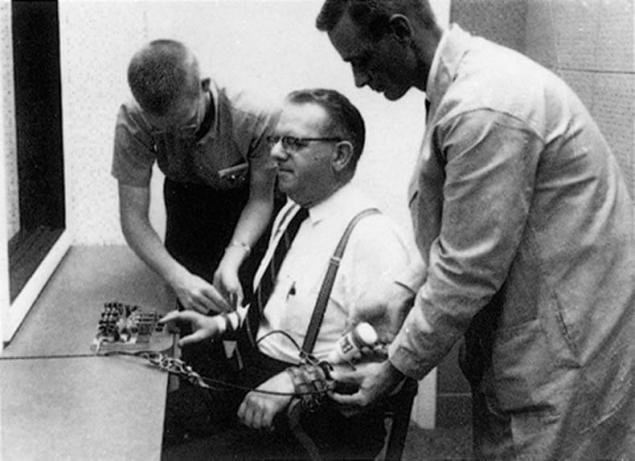The phenomenon of authority - millennial bug
 Bashny.Net
Bashny.Net
Many have probably heard about the Milgram experiment, which argued that the need for obedience to authority is deeply ingrained in our minds. More than just a similar behavior was called "the phenomenon of authority».
Most people are willing to believe the statements of authoritative personalities without having to check the statements made. Of course, with an increase in the level of skepticism and critical thinking, it becomes harder to manipulate people, but also the mechanisms of manipulation becomes more difficult.

It is interesting that this phenomenon many times greatly changed the course of history and this is one of those cases will be my story.
Hippocrates - the living personification of medicine, it is considered the father of medicine. He wrote 72 books, which subsequently made "Hippocratic Collection", which describes the treatment of various diseases, injuries, and some of the main tenets have been described.
In one of his writings, Hippocrates made the fatal conclusion that the inflammatory process in the wound can be reduced by stimulating the production of pus. That is, what is now one of the complications of the surgical wound, while it was accepted as a good thing. And it was believed that the festering wound heals faster clean and many surgeons have sought to ensure that the wound appeared pus. Of course, we did not know what the bacteria do not have the opportunities that we have all blindly believe Hippocrates.
Galen (130 -. 200 years BC) as the personal physician of Emperor Marcus Aurelius wrote more than 400 works, which also pointed to the beneficial effects of suppuration in the wound healing process
. All further medicine developed under the influence of Greek schools and the teaching of Hippocrates, the welfare of the pus was reflected as well in the writings of some of the Arab doctors in the Medical School of Salerno, in the Bamberg surgery and so on.
In the XII century RudzherioFrugardi wrote «Practica chirurgiae» (Practical Surgery) - the first systematic work on surgery in the west, where the teachings of Hippocrates has left its mark.
It was only in 1256 Teoderik, son of Ugo Lucca, being bishop servo published work entitled "Surgery", where for the first time publicly condemned the conviction of the majority of doctors of suppuration:
"Contrary to what is written, and Roger Roland, what they teach many of their followers and professed that all modern surgeons, there is no need to pus in the wound was bleeding. There is no greater error than this. such actions are contrary to the natural course of things, delay the disease and interfere with normal wound healing well. »
Millennial error This doctrine did not last long, in 1363 a prominent surgeon De Sholyak published the book "Great Surgery", which consisted of 7 books in the third book of his works he described their beliefs about the benefits of pus. The popularity of the "Great Surgery" eclipsed Teoderika works and doctors are back to the old beliefs, delaying medical progress for a few hundred years.
And only in the epoch of Revival of Ambroise Paré (1510 - 1590), 400 years later, after a written labor De Sholyak and more than 1700 years, after written Hippocratic collection, proprabotov as an anatomist and surgeon's assistant in parzhiskom hospital "Hotel Dieu" and becoming in future military surgeon, completely rejected the view wholesomeness suppuration and indicated that the wound should be perfectly clean.
Now every little child knows that the pus is bad. And who would have thought that getting this response took in human history more than 1,500 years?
Most people are willing to believe the statements of authoritative personalities without having to check the statements made. Of course, with an increase in the level of skepticism and critical thinking, it becomes harder to manipulate people, but also the mechanisms of manipulation becomes more difficult.

It is interesting that this phenomenon many times greatly changed the course of history and this is one of those cases will be my story.
Hippocrates - the living personification of medicine, it is considered the father of medicine. He wrote 72 books, which subsequently made "Hippocratic Collection", which describes the treatment of various diseases, injuries, and some of the main tenets have been described.
In one of his writings, Hippocrates made the fatal conclusion that the inflammatory process in the wound can be reduced by stimulating the production of pus. That is, what is now one of the complications of the surgical wound, while it was accepted as a good thing. And it was believed that the festering wound heals faster clean and many surgeons have sought to ensure that the wound appeared pus. Of course, we did not know what the bacteria do not have the opportunities that we have all blindly believe Hippocrates.
Galen (130 -. 200 years BC) as the personal physician of Emperor Marcus Aurelius wrote more than 400 works, which also pointed to the beneficial effects of suppuration in the wound healing process
. All further medicine developed under the influence of Greek schools and the teaching of Hippocrates, the welfare of the pus was reflected as well in the writings of some of the Arab doctors in the Medical School of Salerno, in the Bamberg surgery and so on.
In the XII century RudzherioFrugardi wrote «Practica chirurgiae» (Practical Surgery) - the first systematic work on surgery in the west, where the teachings of Hippocrates has left its mark.
It was only in 1256 Teoderik, son of Ugo Lucca, being bishop servo published work entitled "Surgery", where for the first time publicly condemned the conviction of the majority of doctors of suppuration:
"Contrary to what is written, and Roger Roland, what they teach many of their followers and professed that all modern surgeons, there is no need to pus in the wound was bleeding. There is no greater error than this. such actions are contrary to the natural course of things, delay the disease and interfere with normal wound healing well. »
Millennial error This doctrine did not last long, in 1363 a prominent surgeon De Sholyak published the book "Great Surgery", which consisted of 7 books in the third book of his works he described their beliefs about the benefits of pus. The popularity of the "Great Surgery" eclipsed Teoderika works and doctors are back to the old beliefs, delaying medical progress for a few hundred years.
And only in the epoch of Revival of Ambroise Paré (1510 - 1590), 400 years later, after a written labor De Sholyak and more than 1700 years, after written Hippocratic collection, proprabotov as an anatomist and surgeon's assistant in parzhiskom hospital "Hotel Dieu" and becoming in future military surgeon, completely rejected the view wholesomeness suppuration and indicated that the wound should be perfectly clean.
Now every little child knows that the pus is bad. And who would have thought that getting this response took in human history more than 1,500 years?
Tags
Personal development
psychology
women
men
relationships
life
happiness
harmony
love
children
money
wealth
success
See also
Psychology of relations between men and women: humiliation
The more dangerous for women training if the leading man
Guys degenerate how technology has changed the concept of the male
If your man is the Eternal adolescent...
HOW TO LOVE A man or a wise woman 12 RULES
The difference between men and women within the meaning of love and family.
PSYCHOLOGY beautiful woman.
We attack, we attack - theory and practice of psychological aikido
If a man does not take responsibility for the welfare of women
My profession - Bastard: 9 signs of relationship with this man

















